Blackheads are a common skin problem that can be frustrating to deal with. They occur when pores become clogged with oil and dead skin cells, resulting in small, dark bumps on the skin’s surface. While there are many over-the-counter products available to treat blackheads, some people prefer natural remedies.

Lemon is a popular natural remedy for blackheads. The citric acid in lemon juice helps to exfoliate the skin and unclog pores, while its astringent properties help to tighten and shrink pores. Additionally, lemon juice contains vitamin C, which can help to brighten the skin and improve its overall appearance. However, it is important to note that lemon juice can be irritating to some people’s skin, so it is best to do a patch test before using it on the face.
There are several ways to use lemon juice to treat blackheads. One method is to mix lemon juice with baking soda to create a paste, which can be applied to the affected areas and left on for a few minutes before rinsing off. Another option is to mix lemon juice with honey and apply it as a mask. Salt can also be added to lemon juice to create an exfoliating scrub. It is important to note that while lemon juice can be effective for treating blackheads, it should not be used as a substitute for professional medical advice.
Understanding Blackheads

Blackheads are a common skin problem that affects people of all ages. They are small, dark bumps that appear on the skin, usually on the face, neck, chest, back, and shoulders. Blackheads are a type of acne, but they are not caused by dirt, as many people believe. Instead, they are caused by the accumulation of oil and dead skin cells in the pores of the skin.
Causes of Blackheads
Blackheads are caused by the overproduction of sebum, an oily substance that is produced by the sebaceous glands in the skin. When sebum mixes with dead skin cells and other debris on the skin, it can clog the pores, leading to the formation of blackheads. Certain factors can increase the risk of developing blackheads, including:
- Hormonal changes: Hormonal changes during puberty, menstruation, and pregnancy can increase the production of sebum, leading to the development of blackheads.
- Genetics: Some people are more prone to developing blackheads due to their genetics.
- Use of certain skincare products: Some skincare products can clog the pores and contribute to the development of blackheads.
Effects on Skin Health
Blackheads are not harmful to the skin, but they can be unsightly and can affect a person’s self-esteem. If left untreated, blackheads can lead to the development of more severe forms of acne, such as pimples and cysts. Additionally, blackheads can make the skin look dull and uneven, and they can contribute to the development of fine lines and wrinkles.
Using lemon as a natural remedy for blackheads can be effective in controlling the overproduction of sebum and reducing the appearance of blackheads. However, it is important to use lemon in moderation and to dilute it with water, as using undiluted lemon juice can be harsh on the skin and can cause irritation.
The Role of Lemon in Skincare

Lemon Properties
Lemon is a citrus fruit that is known for its high concentration of vitamin C, which is essential for healthy skin. It also contains citric acid, a natural astringent that can help to shrink the pores on the skin, making it an effective remedy for blackheads.
In addition, lemon has antimicrobial and antiseptic properties that can help to fight against bacteria and other harmful microorganisms that can cause skin problems. Its high level of antioxidants can also help to protect the skin from free radical damage, which can lead to premature aging.
Benefits for Blackheads
The properties of lemon make it an effective remedy for blackheads. Its natural astringent properties can help to shrink the pores on the skin, which can prevent the formation of blackheads. Additionally, the citric acid in lemon can help to break down dead skin cells that can clog the pores and lead to blackheads.
To use lemon for blackheads, one can apply fresh lemon juice to the affected area using a cotton ball or pad. Alternatively, one can mix lemon juice with honey or sugar to create a natural exfoliating scrub that can help to remove blackheads.
However, it is important to note that lemon can be irritating to some skin types, especially those with sensitive skin. It is recommended to do a patch test before using lemon on the face and to dilute the lemon juice with water or other ingredients to avoid irritation.
Overall, lemon can be a beneficial ingredient in skincare, particularly for those with blackheads. Its natural astringent and antimicrobial properties can help to prevent and treat blackheads, while its high concentration of vitamin C and antioxidants can help to promote healthy, radiant skin.
Preparation of Lemon Treatment

When it comes to treating blackheads with lemon, there are a few important steps to follow in order to ensure the best possible results. This section will cover the preparation process for using lemon as a treatment for blackheads.
Lemon Juice Extraction
The first step in preparing a lemon treatment for blackheads is to extract the juice from a fresh lemon. This can be done by cutting the lemon in half and squeezing it over a small bowl or container. It is important to use fresh lemon juice, as bottled or processed lemon juice may not be as effective.
Mixtures and Solutions
Once the lemon juice has been extracted, it can be combined with other ingredients to create a mixture or solution for treating blackheads. Some common mixtures include:
-
Lemon juice and baking soda: This mixture can be used as a scrub to exfoliate the skin and remove blackheads. Simply mix equal parts lemon juice and baking soda to create a paste, and apply it to the affected area in a circular motion. Rinse thoroughly with warm water.
-
Lemon juice and honey: This mixture can be used as a mask to soothe and hydrate the skin while also helping to remove blackheads. Mix equal parts lemon juice and honey to create a paste, and apply it to the affected area. Leave on for 10-15 minutes, then rinse with warm water.
-
Lemon juice and salt: This mixture can be used as a scrub to exfoliate the skin and remove blackheads. Mix equal parts lemon juice and salt to create a paste, and apply it to the affected area in a circular motion. Rinse thoroughly with warm water.
It is important to note that lemon can be irritating to some skin types, so it is recommended to do a patch test before applying any lemon treatments to the face. Additionally, lemon treatments should not be used on open wounds or broken skin.
Application Process
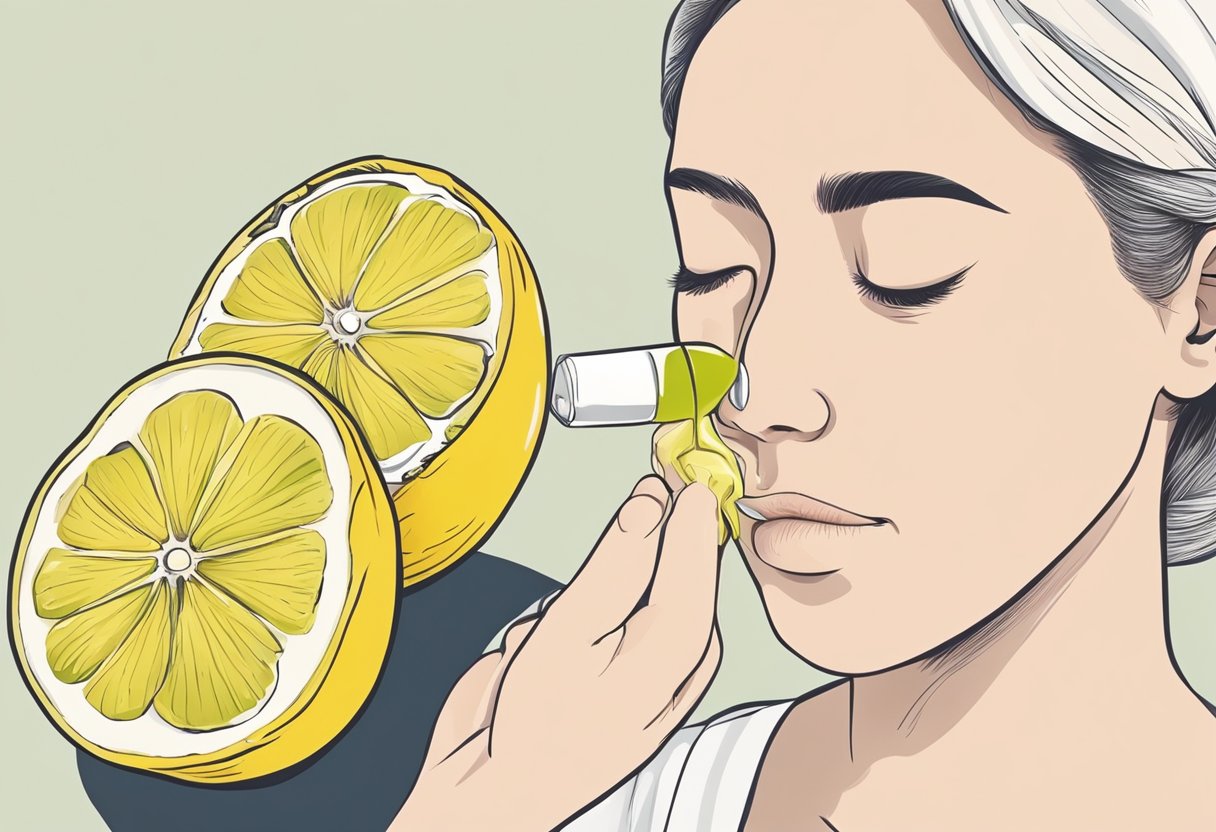
Direct Application Method
One of the easiest and most effective ways to use lemon for blackheads is through direct application. Simply cut a lemon in half and apply it directly to the affected area. Gently rub the lemon in circular motions for one to two minutes, focusing on the areas with blackheads. Leave the lemon juice on for about five to ten minutes, then rinse it off with warm water.
It is important to note that lemon juice can be drying to the skin, so it is recommended to use a moisturizer after rinsing off the lemon juice. This method can be repeated once or twice a week for best results.
Lemon-Based Masks
Another way to use lemon for blackheads is through lemon-based masks. There are several different recipes for lemon-based masks, but a simple one involves mixing lemon juice with honey and oatmeal. Mix one tablespoon of lemon juice with one tablespoon of honey and one tablespoon of oatmeal to form a paste. Apply the paste to the face, focusing on the areas with blackheads. Leave the mask on for 10-15 minutes, then rinse it off with warm water.
Lemon-based masks can be used once a week to help reduce the appearance of blackheads. It is important to note that lemon juice can be irritating to some skin types, so it is recommended to do a patch test before using any lemon-based masks. If any irritation occurs, discontinue use immediately.
In conclusion, lemon is a natural and effective remedy for blackheads. By using the direct application method or lemon-based masks, individuals can help reduce the appearance of blackheads and improve the overall appearance of their skin.
Safety and Skin Considerations
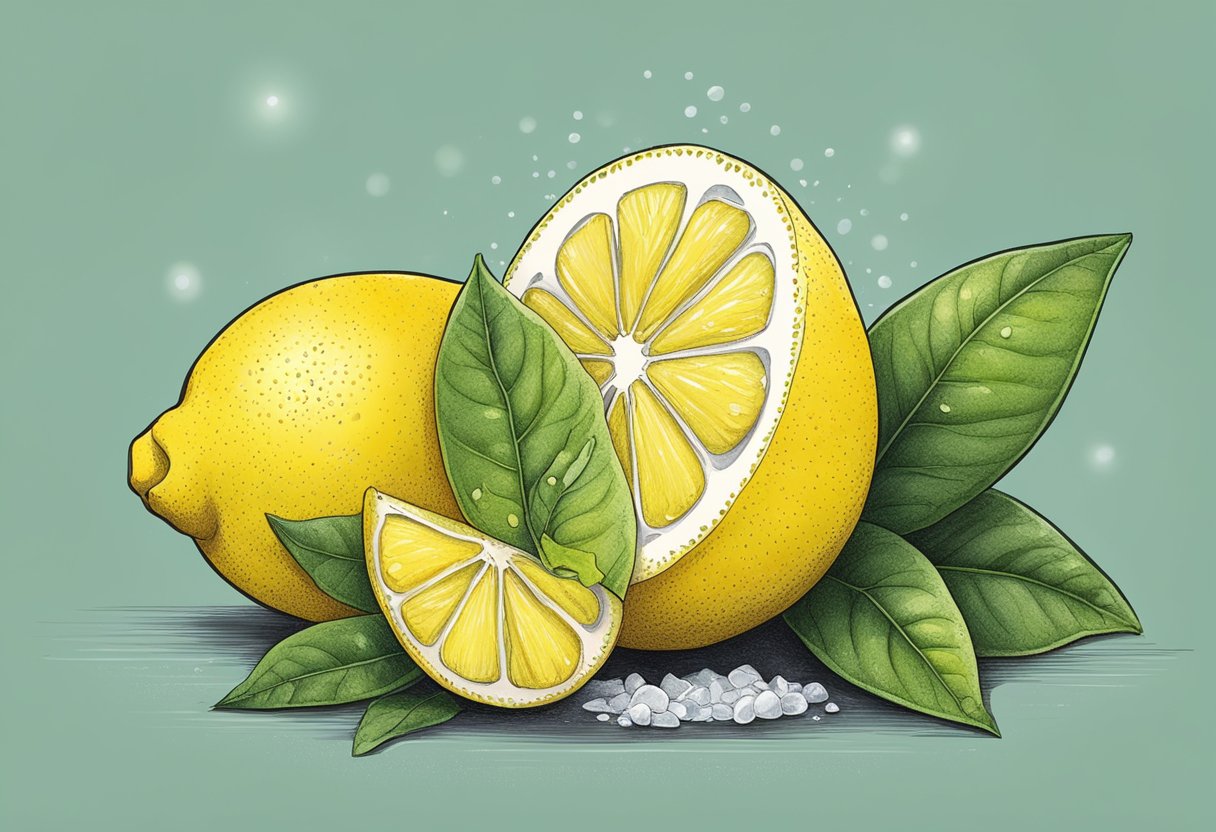
Skin Sensitivity Tests
Before using lemon juice on the skin, it is important to perform a patch test to determine if the skin is sensitive to lemon juice. To do this, apply a small amount of lemon juice to a small area of skin, such as the inside of the wrist or behind the ear, and wait for 24 hours to see if any adverse reactions occur.
If the skin is sensitive to lemon juice, it is not recommended to use it on the skin as it may cause irritation, redness, or a rash. In this case, it is best to consult a dermatologist for alternative treatment options.
Potential Side Effects
While lemon juice is generally safe to use on the skin, it can cause potential side effects in some individuals. Some of the possible side effects of using lemon juice on the skin include:
-
Photosensitivity: Lemon juice can make the skin more sensitive to sunlight, increasing the risk of sunburn and skin damage. It is recommended to avoid sun exposure or use sunscreen after applying lemon juice to the skin.
-
Dryness: Lemon juice can dry out the skin, especially if used frequently or in high concentrations. It is important to moisturize the skin after using lemon juice to prevent dryness and flakiness.
-
Irritation: Lemon juice can cause irritation, especially if the skin is sensitive or if the lemon juice is not diluted properly. It is recommended to dilute lemon juice with water or other natural ingredients, such as honey or yogurt, before applying it to the skin.
It is important to note that lemon juice should not be used as a substitute for medical treatment for severe or persistent blackheads. If the blackheads do not improve with home remedies or if they are accompanied by other symptoms, such as pain, swelling, or infection, it is best to consult a dermatologist for professional treatment options.
Aftercare and Maintenance
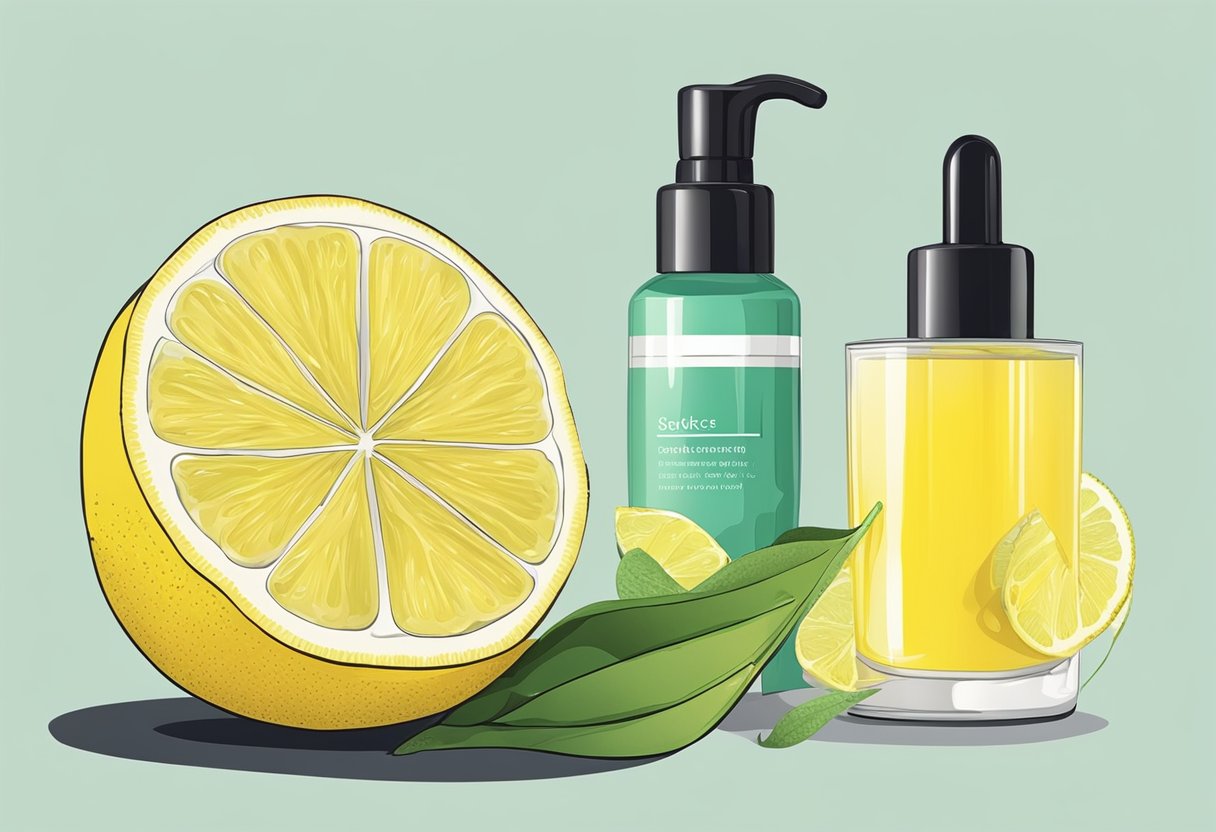
Post-Treatment Care
After treating blackheads with lemon, it is important to take proper care of the skin to avoid any adverse reactions. Here are some tips for post-treatment care:
- Rinse the skin thoroughly with lukewarm water to remove any residue left by the lemon juice.
- Apply a gentle, non-comedogenic moisturizer to hydrate the skin and prevent dryness.
- Avoid exposure to direct sunlight for at least 24 hours after treatment as lemon juice can make the skin more sensitive to UV rays.
- Do not use any harsh exfoliants or scrubs on the treated area for at least two days.
Preventing Blackhead Recurrence
Preventing blackhead recurrence is essential to maintain clear skin. Here are some tips to follow:
- Keep the skin clean by washing it twice a day with a gentle cleanser.
- Avoid using heavy makeup or oily products that can clog pores and cause blackheads.
- Exfoliate the skin once or twice a week to remove dead skin cells and prevent clogged pores.
- Use a non-comedogenic moisturizer to keep the skin hydrated without clogging pores.
- Eat a healthy, balanced diet and drink plenty of water to keep the skin healthy from the inside out.
By following these tips, one can effectively prevent the recurrence of blackheads and maintain clear, healthy skin.
Alternative Blackhead Treatments
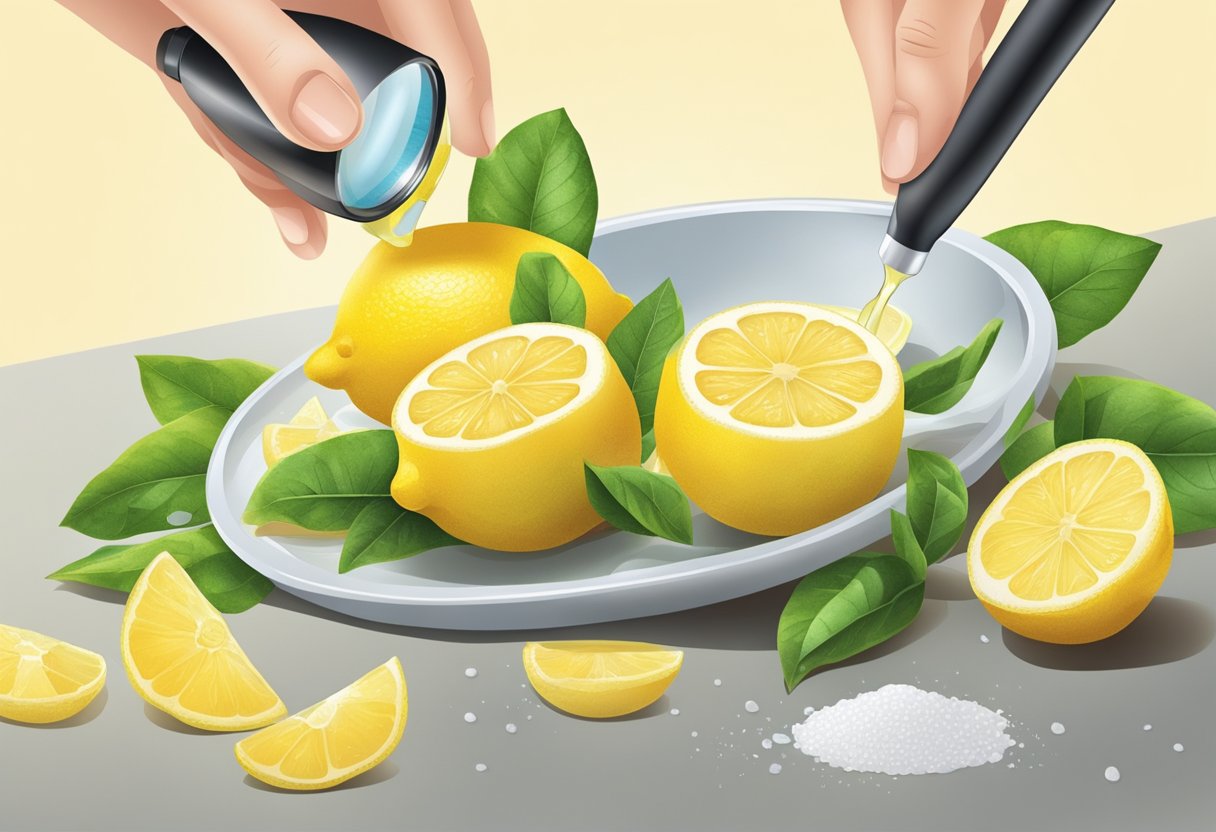
While lemon juice can be an effective treatment for blackheads, there are also other natural remedies that can be used to help reduce their appearance. Here are a few alternative treatments that you might consider:
Baking Soda
Baking soda is a common household item that can be used to exfoliate the skin and remove blackheads. To use baking soda, simply mix a small amount with water to create a paste. Apply the paste to the affected area and gently massage it into the skin. Rinse the area with warm water and pat dry.
Honey
Honey is a natural antibacterial agent that can help to reduce inflammation and prevent the formation of blackheads. To use honey as a treatment, simply apply a small amount to the affected area and leave it on for 10-15 minutes. Rinse the area with warm water and pat dry.
Tea Tree Oil
Tea tree oil is a natural antiseptic that can help to kill bacteria and reduce inflammation. To use tea tree oil as a treatment, mix a few drops with water and apply the mixture to the affected area with a cotton ball. Leave the mixture on for 10-15 minutes before rinsing with warm water and patting dry.
Egg Whites
Egg whites are rich in proteins that can help to tighten the skin and reduce the appearance of blackheads. To use egg whites as a treatment, simply whisk an egg white and apply it to the affected area. Leave the egg white on for 10-15 minutes before rinsing with warm water and patting dry.
Overall, there are many natural remedies that can be used to treat blackheads. While lemon juice is one effective option, it’s always a good idea to experiment with different treatments to find the one that works best for your skin type and needs.
Frequently Asked Questions
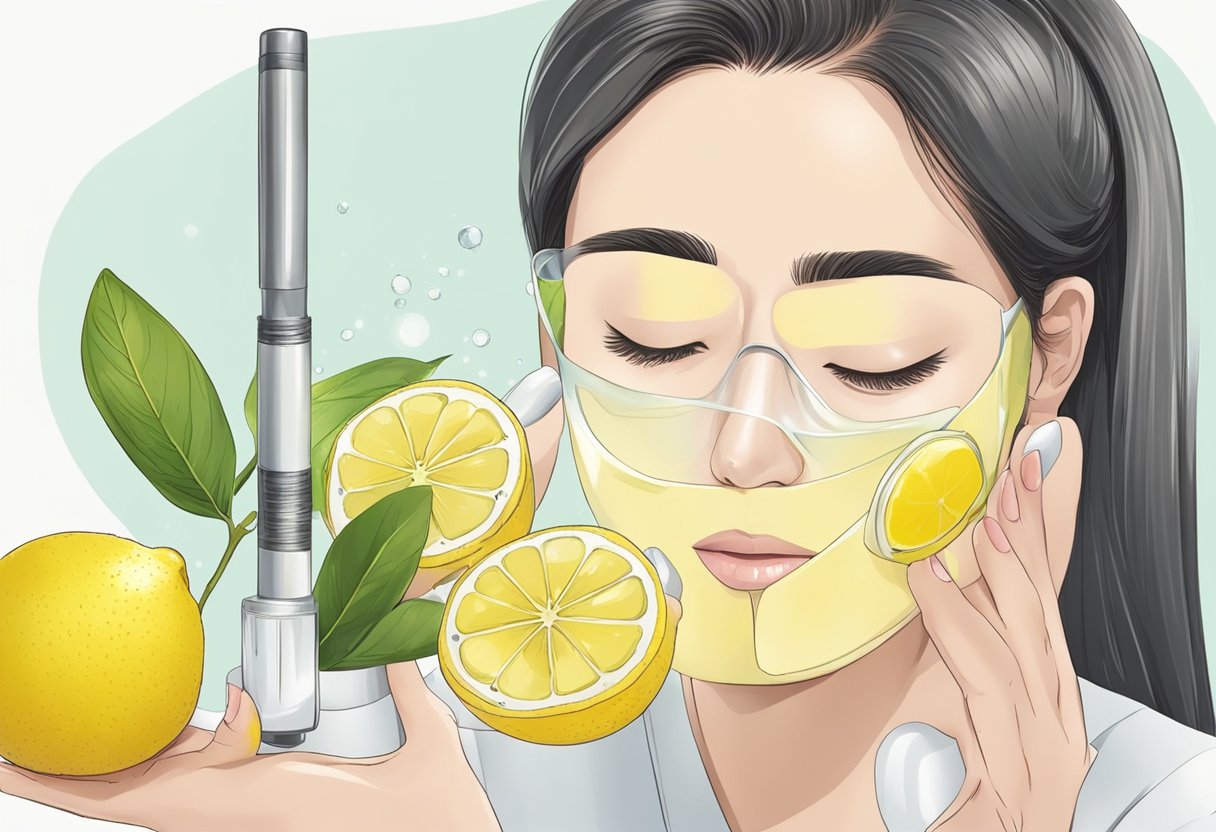
What are the steps to use lemon and salt for blackhead removal?
To use lemon and salt for blackhead removal, mix a tablespoon of salt with a few drops of lemon juice to form a paste. Apply the mixture to the affected area and massage gently for a few minutes. Rinse off with warm water and pat dry. This remedy can help to exfoliate the skin and remove dead skin cells, which can contribute to blackheads.
Can lemon water be effective in treating blackheads and how is it applied?
Lemon water can be effective in treating blackheads due to its astringent properties. To use lemon water, mix equal parts of lemon juice and water and apply the mixture to the affected area with a cotton ball. Leave it on for a few minutes before rinsing off with warm water. This remedy can help to tighten the pores and reduce the appearance of blackheads.
What is the method for using lemon juice to clear blackheads?
To use lemon juice to clear blackheads, apply freshly squeezed lemon juice to the affected area with a cotton ball. Leave it on for a few minutes before rinsing off with warm water. This remedy can help to unclog pores and remove excess oil, which can contribute to blackheads.
How does a mixture of lemon and baking soda work against blackheads?
A mixture of lemon and baking soda can work against blackheads by exfoliating the skin and removing dead skin cells. To use this remedy, mix equal parts of baking soda and lemon juice to form a paste. Apply the mixture to the affected area and massage gently for a few minutes before rinsing off with warm water.
Is it possible to extract deep blackheads using a lemon-based home remedy?
While lemon-based home remedies can help to reduce the appearance of blackheads, they may not be effective in extracting deep blackheads. It is best to seek professional help for deep blackheads.
What is the procedure for using lemon and honey to eliminate blackheads?
To use lemon and honey to eliminate blackheads, mix equal parts of lemon juice and honey to form a paste. Apply the mixture to the affected area and leave it on for a few minutes before rinsing off with warm water. This remedy can help to soothe the skin and reduce inflammation, which can contribute to blackheads.
